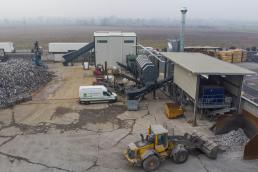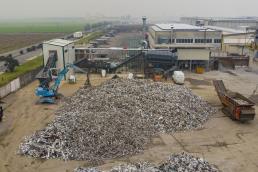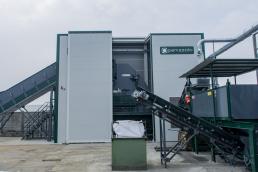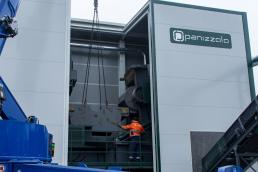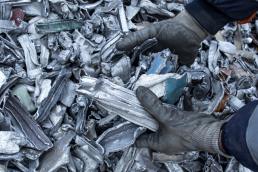From scrap to aluminium ready to melt: the new recycling plant in Deral
Starting from aluminum scrap, Deral Spa produces high quality billets for the national and international market. To ensure high production quality, the material loaded into the ovens must be carefully separated from any impurities. For this reason, the company has its own treatment cycle which has recently been enhanced by the Panizzolo Recycling Systems plant with Mega 1100 hammer mill.
With the starting of the plant, we had the pleasure of interviewing Mauro Cibaldi and Pietro Giulio Vincoli, respectively President and CEO of the Italian foundry DERAL S.p.A
Good morning Mr. President. How Deral was born?
Cibaldi: Deral was founded in 1986 in Manerbio, in the province of Brescia, initially dealing with scrap discarded from extrusion production cycles and from which we produced new billets. Over the years, the evolution of production has led us to expand the range of incoming aluminum, reaching today to be able to insert material from the demolition of windows and profiles into the melting cycle.
This evolution has introduced greater attention to the quality of recycling and to the enhancement of the raw material from scrap. In 2015 this process saw the replacement of the old line with a first Flex 1000 mobile drum plant in Panizzolo complete with eddy current. Then over the years we have also implemented it with an x-ray selector that allows us to effectively identify and separate the secondary alloys from the primary aluminum ready for use.
At Deral today we are structured for a production of around 40-45,000 tons / year of finished product and we expect production growth over the next ten years, thanks to the new Mega 1100 and the rapidly expanding Italian market.
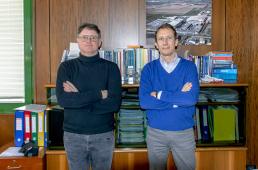
A few numbers about your staff and your business?
Cibaldi: To date, the staff consists of 35 employees and 5 directors, we occupy an area of about 28,000 square meters of which 4,000 square meters are dedicated to production in a covered warehouse and 600 square meters of offices. By 2030 we expect to be able to expand production with an additional furnace and a new line for casting billets
As regards the flow we can say that we receive on average about 40 / 45,000 tons of materials divided between scrap, pure aluminum ingots and, to a minimum, alligants. The output is mainly in the form of an aluminum billet and, to a minimum, a waste that is defined as slag. All our waste, slag or waste that comes out of the shredding system that is not correct for us, has an economic value and is therefore recovered.
How did you know Panizzolo Recycling Systems?
Vincoli: I went to a customer of yours to see a Panizzolo recycling plant at work, in particular on the crushing process of electric motors. I immediately liked the basic idea: more compact hammer mills with a more than adequate investment and management cost, compared to a market that generally sees large machinery with considerable costs. An example? The maintenance of a 100 kg hammer is not that of a 22 kg hammer and with the Flex 1000 mobile drum we have processed 10,000 tons of material for 3-4 years.
How the Panizzolo system makes your treatment cycle more efficient?
Vincoli: At the beginning of the business we worked with shear presses and carried out the selection and cleaning phases manually. In particular, our double shaft shredder produced a very large piece of aluminum (50-60 cm) and forced us to slow down production. Furthermore, the quality of the product was not perfect with clear repercussions at the time of casting. For this reason, in recent years we have opted for complete and more effective systems such as the Panizzolo line, up to the new x-ray selection.
One of the first Panizzolo machines installed, due to timing reasons, was the Flex 1000 mobile drum, started up in a very short time while now we have switched to a stationary Mega 1100 hammer mill. Our first need was to increase the production capacity of the grinder and from the first accounts of the new production cycle we have already seen a clear improvement. With the grids set for our scrap we have calculated a productivity of about 15/16 tons / hour.
A high level of control is important in a good machinery. We want to support the operators with new technologies for monitoring production, so that the plant operates every day at its maximum potential. The new software, which operates at industry 4.0 logic, will analyze all the operating data of the machine and will provide that fundamental feedback to understand where we are going and how we can improve.
What prompted you to choose Panizzolo Recycling Systems as your technology supplier?
Vincoli: Surely one of the reasons is that Mauro Panizzolo has a long experience with grinding and hammer mills. He used them personally, noted strengths and weaknesses and created a product based on his own experiences. There are other shredders of this size but they are not up to the processing of our ferrous scrap. I also found the Panizzolo technical office to be very prepared and professional.
The structure of the Panizzolo hammer mill at the carpentry level is good. I personally visited the plant where all the machines are built, noting that the carpentry is also inserted in an international context of high quality for railway supplies
This is further confirmed by the fact that our Flex 1000 Mobile had no problems, even though it worked for many years at an intense production regime.
Furthermore, the Panizzolo plant stands out for its simplicity and low operating costs, features that avoid having to resort to highly specialized or constantly present personnel. Following the simple routine maintenance, the Panizzolo mill has no problem, with undoubtedly lower costs than the double-shaft hydraulic shredders on the market.
There are other models on the market as well, but normally they are mills of 1,000 horsepower and up. Unlike, I was looking for a medium-sized hammer mill and in Italy the high-quality medium-sized shredder is located in Panizzolo. I think it is counterproductive to treat a scrap like ours with high power systems. The Flex 1000 Mobile drum has allowed us to operate with a much less demanding system and with a productivity, in two working shifts, between 100 and 150 tons of processed material.
How important is the patented interchangeable cradle in grinding processing?
Vincoli: The interchangeable cradle has a simple and effective engineering that allows for really fast maintenance. Not only the extraction of the cradle, but also the extraction of the rotor itself is very practical. In a large hammermill, maintenance of the hammers would normally require a production stop of at least one day. Unlike in Panizzolo machines, it only takes a few hours if you do not have a spare rotor. With the Flex 1000 Mobile we had two rotors and therefore set off in less than half an hour
Returning to the cradle I think its sizing is ideal, so much so that I’m sure I will retire before having to replace it! Seeing the side walls and the reinforcements below I don’t think it will be subject to wear for at least 10 years!
What hourly productivity do you expect from the new plant?
Vincoli: Definitely we will produce at least 12 tons per hour, but since the recent start up we have already calculated that we are producing an average of 15/16 tons per hour.
How is your commercial presence distributed between Italy and abroad?
Cibaldi: Regarding the input we have to make to major distinctions. Scrap is predominantly Italian, with a quantity of less than 10% coming from abroad. Conversely, the pure aluminum ingots are all produced outside the EU.
Regarding our sales process, 60% of our turnover is directed to our parent company Estral. The remaining 40% is almost all destined for the Italian market, where there is the presence of about 45 extruders.
What are the environmental policies that you apply in Deral Spa
Cibaldi: We are ISO 9001 and ISO 14001 certified and have the certificate 333 of 2011 which certifies the transformation of our waste into secondary raw material. In addition, in December 2020 we also received the environmental assertion validation certificate.
The environmental awareness in Deral is growing constantly and leads us to apply what are defined as the “best available technologies” in our ovens, as well as to maximize the use of energy from renewable and natural sources. In June 2020 the new B.A.T. for the metallurgy sector, providing for a continuous monitoring system for emissions. For this reason we have installed on all our fireplaces special detectors that analyze the outgoing emissions every 5 seconds.
For the energy aspect, together with our parent company, we have an energy manager through which we plan the use of renewable energy. In addition, in 2020 our parent company completed a 1 megawatt solar panel system and therefore many machines can benefit from self-produced energy.
How the foreign aluminum market is structured?
Cibaldi: Italy is the European leader in the field of extrusion both in terms of production and quality and in this panorama Deral is among the five main national billet producing foundries.
The strong propensity for recycling has allowed Italy to develop more than other European countries where, unlike, the creation of a few large foundries has been favored. Italy therefore has a very large production and quality capacity with an export trend that is growing every year.
As far as the final purchase area of our products is concerned, we can say that the German automotive sector dominates. Many German vehicles are structured with Made in Italy aluminum.
What are your sources on the market trend?
Cibaldi: We are operators constantly active on the market, interacting with many subjects. This allows us to find news on the trend day by day, together with the classic information channels such as sector publications.
We are also part of the CENTROAL trade association, of which I am also president, because we believe that associations help individual realities. If there are regulatory problems, which in some way can have an impact, going it alone makes no sense.
What is your opinion on the changes in the sector in the coming years?
Vincoli: Big changes are taking place in our industry. In the next 10/15 years there will be more and more structured companies with complete systems that carry out the total enhancement of the material internally. In this process, the figure of the mere scrap dealer will disappear. In order to face the near future, companies must therefore structure or deconstruct themselves. An example? As a foundry, we collect demolition material or ready-made material, there is no more middle ground.
In Deral, thanks to the very strong demand for aluminum and the regulations aimed at reducing CO2, we are considering making an additional investment in the treatment plant. For this reason, I think that the 1100 Mega Panizzolo shredder has considerable chances of success for the treatment of aluminum. With the same machine it is possible to work both the profile and the casing and also other types of aluminum. However, it remains a machine with a decent size at low cost.
Cibaldi: At a European and national level, a whole series of incentives are flourishing on products and materials that have particular value within the circular economy. Among these materials, aluminum plays one of the most important roles. Aluminum is 100% recyclable, its recycling process requires 1/20 of the energy that would be used starting from the raw material. It is used more and more due to its lightness and strength and involves very little CO2 emissions during melting. All these are elements on which the focus is predominantly and will ensure that aluminum becomes the material of the near future.
